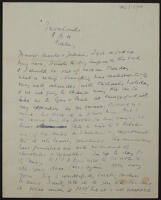Has been receiving treatment for deafness in Switzerland and supporting her husband’s election campaign. Thanks her for the photographs (see 2/35). She will not be able to attend the conference in India, but is very interested in the progress of the women’s movement there.
—————
Transcript
24th. November. 1935.
My dear Mrs. Hamid Ali,
I am afraid you will think that I am most remiss in not having replied to your letter before. I was away in Switzerland when it came receiving treatment from a specialist for deafness, and while I was there the General Election was announced and I had to hurry home to take my part in it and support my husband’s candidature in East Edinburgh. I am so glad to say that he was elected Member of Parliament for that constituency.
I am perfectly charmed with the photographs that you send me. I think the photograph of you and your husband is delightful and most beautiful, especially of you. I was also greatly interested to see the pictures of your home. Thank you so much for sending them to me. They will serve as a very delightful remembrance of the very great pleasure it was to my husband and to me to meet you and to hear something of your wonderful work.
It is very kind of you to invite me to the Indian Conference, but I am sorry to say that my health prevents me from accepting such an attractive invitation. The treatment in Switzerland for my deafness has not up till now been a success and I am extremely deaf, and until this condition passes away I am not fit to take part in any public life at all. I believe it is only a temporary condition, but I have no idea how long it is going to last.
I shall be with you in thought at your Congress, and I shall follow your deliberations with intense interest. As you know, my whole life has been given to the woman’s movement, and there is no development of the woman’s that I follow with such interest as that in India. The movement there fulfills† all that I had hoped and dreamed of in my young days. It is so valiant and courageous, so definite and determined and at the same time so entirely free from bitterness or narrowness of conception. People in the very highest position have testified to their belief that it is the most important and most uplifting movement in India, and I am happy to think that such general acknowledgement and admiration has been accorded publicly. I trust and pray that the woman’s movement will keep itself free of all political contamination and will maintain its character and will ultimately set an ideal which will be followed by the rest of the country. India has such a very great future.
With warmest good wishes,
Yours very sincerely,
[blank]
Mrs. Hamid Ali,
The Residency,
Satara,
India.
—————
† Sic.
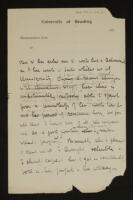

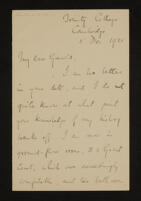





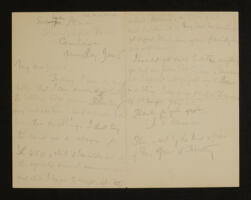

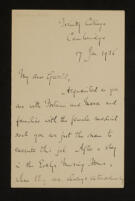

![Four letters from 'Jack' [François Ceccaldi] to 'Flaminica' [Lady Frazer]](/uploads/r/trinity-college-library/4/3/d/43dfef9788587e1c732632bff25324812506f4653bf68d6db85861c13e0cfc2c/FRAZ.32.110-114_thumb.jpg)
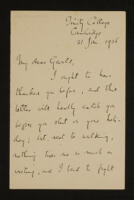

![Three letters from 'Jack' [François Ceccaldi] to 'Flaminica' [Lady Frazer]](/uploads/r/trinity-college-library/5/f/7/5f7dda206782de75771b2666e51250ba0d29e0d93a953c54c0a3d09303767db6/FRAZ.32.118-120_thumb.jpg)













